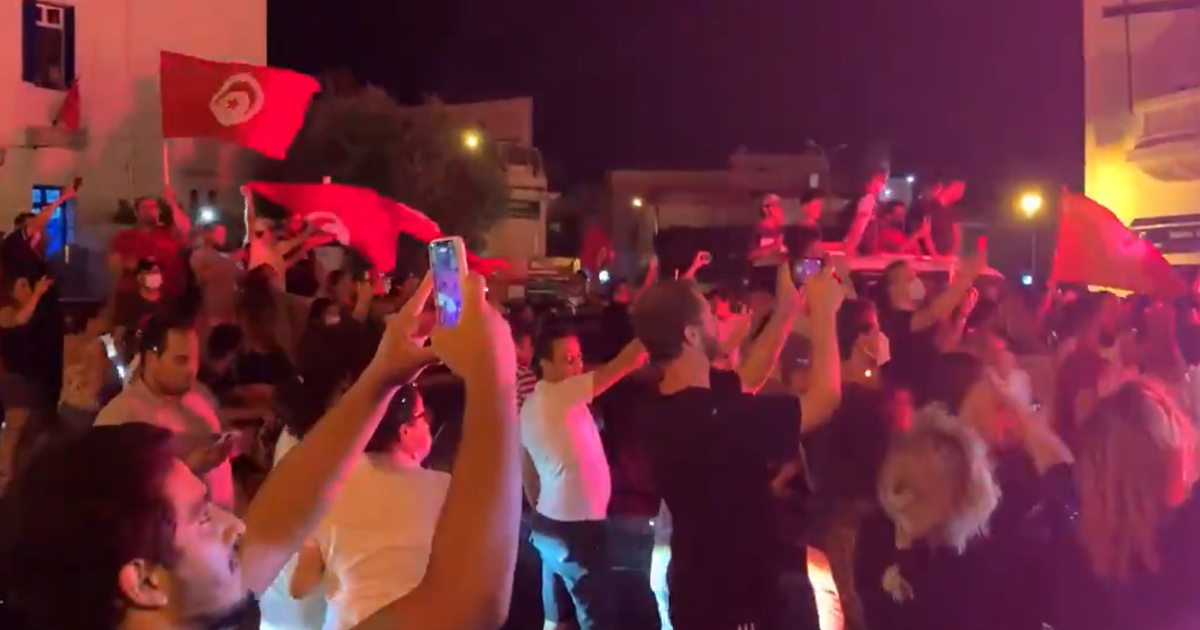The media reading of the leap into the void, which Tunisia took recently after the Jasmine Revolution, varies greatly according to the angle of view and the country to which these media return to. versus democracy.
This is what an article in the Swiss newspaper Lotan (Le temps) sees by Olivier Perrin, in which he says that Tunisia, 10 years after the fall of the "authoritarian" regime of President Zine El Abidine Ben Ali, is living in dark and contradictory hours after the campaign launched by President Kais Saied on the pretext of fighting corruption.
The article indicated that Said demanded that 460 businessmen accused of embezzlement be held accountable during the era of Ben Ali, based on a previous report of an investigation committee into corruption and embezzlement cases during the days of the former "dictator" who died in September 2019 in Saudi Arabia.
The writer says that after about a week of seizing all the executive authorities with the support of the security services, and suspending the activity of Parliament for a month, Saeed has not yet appointed a new prime minister to succeed Hisham Al-Mashishi, who dismissed him, and only attacked those he said were looting public money.
He pointed out that many media outlets expressed their fear of Tunisia's slide towards a new authoritarian rule, and criticized what it described as Europe's inaction, at a time when US Secretary of State Anthony Blinken stated that the Tunisian president assured him that he was working towards a return to democracy.
The Renaissance Movement
The writer cited an opinion in the French magazine Courrier International, in which she indicated that Rached Ghannouchi, leader of the Ennahda party and speaker of Parliament suspended for 30 days, threatened to take to the street, and he spoke Thursday to Agence France-Presse, "with a speech that confuses the pursuit of reconciliation and the threat ".
The magazine's opinion adds that Ghannouchi said that he prefers the path of dialogue, but is also ready to ask the people to defend their democracy.
The magazine warned that this attraction is taking place in a country where the number of patients and people infected with the Corona pandemic is increasing, as a new wave of the epidemic has been sweeping it since last June, and its hospitals suffer from a shortage of vaccines and oxygen, and the number of daily deaths due to the epidemic is estimated at about 100 to 200 people.
Where is Europe?
The Lotan article explained that in the midst of this chaos, Europe seemed to be emphasizing loud and clear the importance of Tunisia as the only democracy in North Africa, noticeably absent during the 18 months of the outbreak of the pandemic in Tunisia, leaving the country mired in deep crisis, and in The few times I turned to it, it was almost confined to dealing with the issue of immigration, focusing on one of the symptoms of the crisis and at the same time ignoring its causes in a passivity that made it involuntarily part of the problem.
The writer cautioned that Europe's contentment with looking at Tunisia from the angle of its fear of immigrants, offset by the Turkish press's view of the suspension of the House of Representatives and the government in Tunisia as a coup against the legitimate political authority.
And the Turkish newspaper, Yeni Şafak, was quoted as saying that the preparation for the coup took place in several stages, starting with the demonization of Ennahda and then instilling the idea that the current period of parliamentary democracy did not contribute to the prosperity of the people, and then organized false demonstrations of discontent in the streets, She pointed out that the actors, who prefer to practice political coups rather than the tools of democracy, used Saeed, who was carried by the ballot boxes to the presidential seat.
The writer said that the British “Financial Times” magazine called on the United States and the European Union “not to repeat the mistake they made in Egypt,” but that the two parties are still “waiting to see the course that things will take in Tunisia,” and considered that “it would be disastrous to leave the country.” The country is falling into the scourge of Arab authoritarian regimes.
the strong man?
The writer believes that the West, led by Europe, should prepare itself with a well-thought-out strategy towards the Middle East, and abandon the wait-and-see attitude that is governed by the opinion that it is easier to dialogue with a "strong man than weak institutions."
The newspaper asked whether the description of a "strong man" would apply to Said, the law professor who was famous for his television appearances and his break with the political class, noting that he is an important opponent of the Ennahda movement, although - regardless of whether what he did was a coup or not - he was not the first Who condemned “nepotism, corruption, banditry and impunity, and indeed, political parties and NGOs have denounced all of this through the media over the past few months.”
And the Lotan newspaper article concluded by saying, "Said is far from being a good, enlightened president or providential envoy, and even if he is a genius or a saint, in no way should he be allowed to carry out a coup."
He added that Tunisia has entered a new phase, with which all scenarios are now possible, and this is a leap into the void for this young democracy.

